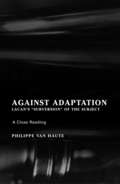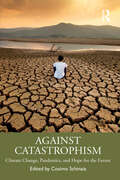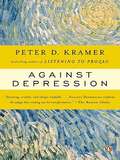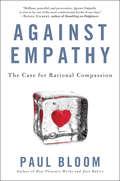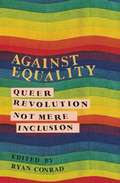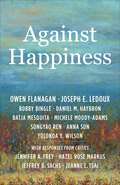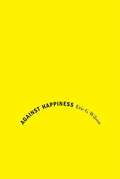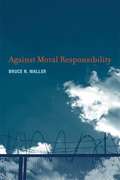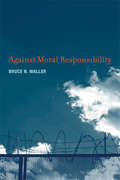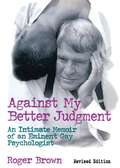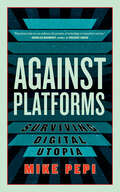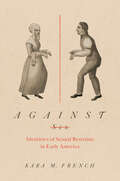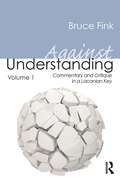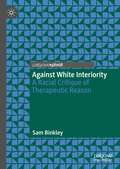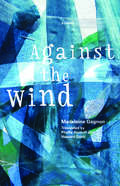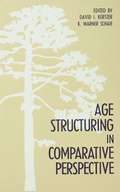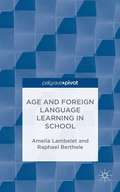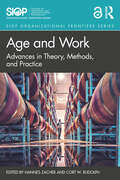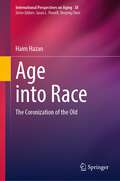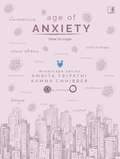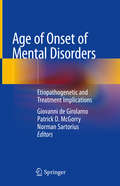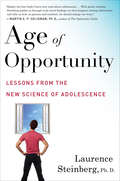- Table View
- List View
Against Adaptation: Lacan's Subversion of the Subject (Lacanian Clinical Field)
by Philippe Van Haute"Van Haute's exegesis of Lacan's essay is as lucid as it is cogent--an admirable (and very illuminating) achievement."-William Richardson
Against Autonomy
by Sarah ConlySince Mill's seminal work On Liberty, philosophers and political theorists have accepted that we should respect the decisions of individual agents when those decisions affect no one other than themselves. Indeed, to respect autonomy is often understood to be the chief way to bear witness to the intrinsic value of persons. In this book, Sarah Conly rejects the idea of autonomy as inviolable. Drawing on sources from behavioural economics and social psychology, she argues that we are so often irrational in making our decisions that our autonomous choices often undercut the achievement of our own goals. Thus in many cases it would advance our goals more effectively if government were to prevent us from acting in accordance with our decisions. Her argument challenges widely held views of moral agency, democratic values and the public/private distinction, and will interest readers in ethics, political philosophy, political theory and philosophy of law.
Against Catastrophism: Climate Change, Pandemics, and Hope for the Future
by Cosimo SchinaiaAgainst Catastrophism explores catastrophism from multiple vantage points and considers the impact of ongoing crisis on individuals.Bringing together contributors from psychoanalysis, economics, anthropology, and gastroenterology, this book explores themes including fossil fuel culture, social movements like Extinction Rebellion, the COVID-19 pandemic, media messaging, and the future of food supply chains. By assessing the value of a constant barrage of information about catastrophes and considering the need for a containing environment, the chapters explore how we can avoid endorsing a closed-off vision of the future and instead unlock possibilities. The book concludes with a discussion of optimism, radical hope, and how we can put forward a new narrative on nature.Against Catastrophism will be of great interest to psychoanalysts, psychologists, psychiatrists, economists, anthropologists, sociologists, food scientists, environmentalists, ecologists, politicians, and communication experts.
Against Depression
by Peter D. KramerIn his landmark bestseller Listening to Prozac, Peter Kramer revolutionized the way we think about antidepressants and the culture in which they are so widely used. Now Kramer offers a frank and unflinching look at the condition those medications treat: depression. Definitively refuting our notions of "heroic melancholy," he walks readers through groundbreaking new research—studies that confirm depression's status as a devastating disease and suggest pathways toward resilience. Thought-provoking and enlightening, Against Depression provides a bold revision of our understanding of mood disorder and promises hope to the millions who suffer from it. .
Against Empathy: The Case for Rational Compassion
by Paul BloomWe often think of our capacity to experience the suffering of others as the ultimate source of goodness. Many of our wisest policy-makers, activists, scientists, and philosophers agree that the only problem with empathy is that we don't have enough of it.Nothing could be farther from the truth, argues Yale researcher Paul Bloom. In AGAINST EMPATHY, Bloom reveals empathy to be one of the leading motivators of inequality and immorality in society. Far from helping us to improve the lives of others, empathy is a capricious and irrational emotion that appeals to our narrow prejudices. It muddles our judgment and, ironically, often leads to cruelty. We are at our best when we are smart enough not to rely on it, but to draw instead upon a more distanced compassion. Basing his argument on groundbreaking scientific findings, Bloom makes the case that some of the worst decisions made by individuals and nations--who to give money to, when to go to war, how to respond to climate change, and who to imprison--are too often motivated by honest, yet misplaced, emotions. With precision and wit, he demonstrates how empathy distorts our judgment in every aspect of our lives, from philanthropy and charity to the justice system; from medical care and education to parenting and marriage. Without empathy, Bloom insists, our decisions would be clearer, fairer, and--yes--ultimately more moral.Brilliantly argued, urgent and humane, AGAINST EMPATHY shows us that, when it comes to both major policy decisions and the choices we make in our everyday lives, limiting our impulse toward empathy is often the most compassionate choice we can make.
Against Equality
by Ryan ConradWhen "rights" go wrong.Does gay marriage support the right-wing goal of linking access to basic human rights like health care and economic security to an inherently conservative tradition?Will the ability of queers to fight in wars of imperialism help liberate and empower LGBT people around the world?Does hate-crime legislation affirm and strengthen historically anti-queer institutions like the police and prisons rather than dismantling them? The Against Equality collective asks some hard questions. These queer thinkers, writers, and artists are committed to undermining a stunted conception of "equality." In this powerful book, they challenge mainstream gay and lesbian struggles for inclusion in elitist and inhumane institutions. More than a critique, Against Equality seeks to reinvigorate the queer political imagination with fantastic possibility! "In an era when so much of the lesbian and gay movement seems to echo the rhetoric of the mainstream Establishment, the work of Against Equality is an important provocation and corrective.... I hope this book is read widely, particularly by the people who will most disagree with it; in the tradition of the great political pamphleteers, this collection should spark debate around some of the key issues for our movement." -Dennis Altman, author of Homosexual: Oppression & Liberation "Against Equality issues a radical call for social transformation. Against and beyond the "holy trinity" of pragmatic gay politics-marriage, militarism, and prison-the queer and trans voices archived in this collection offer a radical left critique of neoliberalism, capitalism, and state oppression. In a format accessible and enlivening, equally at home in the classroom and on the street, this book keeps our political imaginations alive. Prepare to be challenged, educated, and inspired." -Margot Weiss, author of Techniques of Pleasure
Against Equality: Queer Revolution, Not Mere Inclusion
by Ryan ConradWhen “rights” go wrong.<P> Does gay marriage support the right-wing goal of linking access to basic human rights like health care and economic security to an inherently conservative tradition?<P> Will the ability of queers to fight in wars of imperialism help liberate and empower LGBT people around the world?<P> Does hate-crime legislation affirm and strengthen historically anti-queer institutions like the police and prisons rather than dismantling them?<P> The Against Equality collective asks some hard questions. These queer thinkers, writers, and artists are committed to undermining a stunted conception of “equality.” In this powerful book, they challenge mainstream gay and lesbian struggles for inclusion in elitist and inhumane institutions. More than a critique, Against Equality seeks to reinvigorate the queer political imagination with fantastic possibility!
Against Happiness
by Owen Flanagan Batja Mesquita Anna Sun Joseph E. LeDoux Daniel M. Haybron Michele Moody-Adams Bobby Bingle Songyao Ren Yolonda Y. WilsonThe “happiness agenda” is a worldwide movement that claims that happiness is the highest good, happiness can be measured, and public policy should promote happiness. Against Happiness is a thorough and powerful critique of this program, revealing the flaws of its concept of happiness and advocating a renewed focus on equality and justice.Written by an interdisciplinary team of authors, this book provides both theoretical and empirical analysis of the limitations of the happiness agenda. The authors emphasize that this movement draws on a parochial, Western-centric philosophical basis and demographic sample. They show that happiness defined as subjective satisfaction or a surplus of positive emotions bears little resemblance to the richer and more nuanced concepts of the good life found in many world traditions. Cross-cultural philosophy, comparative theology, and social and cultural psychology all teach that cultures and subcultures vary in how much value they place on life satisfaction or feeling happy. Furthermore, the ideas promoted by the happiness agenda can compete with rights, justice, sustainability, and equality—and even conceal racial and gender injustice.Against Happiness argues that a better way forward requires integration of cross-cultural philosophical, ethical, and political thought with critical social science. Ultimately, the authors contend, happiness should be a secondary goal—worth pursuing only if it is contingent on the demands of justice.
Against Happiness: In Praise of Melancholy
by Eric G. WilsonIn Against Happiness, the scholar Eric G. Wilson argues that melancholia is necessary to any thriving culture, that it is the muse of great literature, painting, music, and innovation and that it is the force underlying original insights and suggests it would be better to relish the blues that make humans people.
Against Moral Responsibility
by Bruce N. WallerIn Against Moral Responsibility, Bruce Waller launches a spirited attack on a system that is profoundly entrenched in our society and its institutions, deeply rooted in our emotions, and vigorously defended by philosophers from ancient times to the present. Waller argues that, despite the creative defenses of it by contemporary thinkers, moral responsibility cannot survive in our naturalistic-scientific system. The scientific understanding of human behavior and the causes that shape human character, he contends, leaves no room for moral responsibility. Waller argues that moral responsibility in all its forms--including criminal justice, distributive justice, and all claims of just deserts--is fundamentally unfair and harmful and that its abolition will be liberating and beneficial. What we really want--natural human free will, moral judgments, meaningful human relationships, creative abilities--would survive and flourish without moral responsibility. In the course of his argument, Waller examines the origins of the basic belief in moral responsibility, proposes a naturalistic understanding of free will, offers a detailed argument against moral responsibility and critiques arguments in favor of it, gives a general account of what a world without moral responsibility would look like, and examines the social and psychological aspects of abolishing moral responsibility. Waller not only mounts a vigorous, and philosophically rigorous, attack on the moral responsibility system, but also celebrates the benefits that would result from its total abolition.
Against Moral Responsibility
by Bruce N. WallerA vigorous attack on moral responsibility in all its forms argues that the abolition of moral responsibility will be liberating and beneficial.In Against Moral Responsibility, Bruce Waller launches a spirited attack on a system that is profoundly entrenched in our society and its institutions, deeply rooted in our emotions, and vigorously defended by philosophers from ancient times to the present. Waller argues that, despite the creative defenses of it by contemporary thinkers, moral responsibility cannot survive in our naturalistic-scientific system. The scientific understanding of human behavior and the causes that shape human character, he contends, leaves no room for moral responsibility.Waller argues that moral responsibility in all its forms—including criminal justice, distributive justice, and all claims of just deserts—is fundamentally unfair and harmful and that its abolition will be liberating and beneficial. What we really want—natural human free will, moral judgments, meaningful human relationships, creative abilities—would survive and flourish without moral responsibility. In the course of his argument, Waller examines the origins of the basic belief in moral responsibility, proposes a naturalistic understanding of free will, offers a detailed argument against moral responsibility and critiques arguments in favor of it, gives a general account of what a world without moral responsibility would look like, and examines the social and psychological aspects of abolishing moral responsibility. Waller not only mounts a vigorous, and philosophically rigorous, attack on the moral responsibility system, but also celebrates the benefits that would result from its total abolition.
Against My Better Judgment: An Intimate Memoir of an Eminent Gay Psychologist
by Roger BrownAgainst My Better Judgment: An Intimate Memoir of an Eminent Gay Psychologist is an extraordinary and moving account of the life of a gay man in his late 60s after he loses his companion of 40 years to cancer. A leading professor of psychology at Harvard University, Roger Brown bravely comes forth with his compelling story of grief, loneliness, and a relentless search for intimacy, healing, and self-acceptance. Readers gain insight into a stage of life experienced by gay men of which little is written or spoken due to the ageism that characterizes homosexual culture. Against My Better Judgment reveals deeply personal truths that will prepare gay men for what to expect in the later stages of life. Universal in nature, these truths will speak to readers from various lifestyles and of all ages. Readers will recognize the book as a story of looking for love in all the wrong places, but will also see in it a process of discovery--both internal and external. In the aftermath of his lover&’s death, Brown turns to prostitutes for companionship, for relieving repressed sexual energy, and even for love. Through his unique relationships with three young men, he does not find the romantic love he so desperately seeks, but discovers that his idea of human nature has been formed by his particular life position and association with people who share his values, knowledge, and privileges. Once he goes outside his social and intellectual circle, he acquires a new perspective on life and realizes how far from universal truth his notions of humanity have been.Readers of Against My Better Judgment will gain a different perspective on the complexities of love, relationships, fidelity, human nature, and the hardships of life inevitably faced by all humans--straight, gay, or bisexual. Gay men, lesbians, psychologists, widowers, therapists, and anthropologists, as well as sensitive readers of any background, will heighten their understanding of what it means to be human. This remarkable story makes a tremendous contribution to existing gay literature and the timeless struggle of art and literature to make sense of the universe and the place of humans within it. Echoing life, Against My Better Judgment, with its brutal honesty, intrigues and repels alternately, just as it elicits both sadness and laughter.
Against Platforms: Surviving Digital Utopia (Activist Citizens Library)
by Mike PepiA bold and imaginative critique of the hidden costs of digital life – and a manifesto for a better future . . .At the turn of the millennium, digital technologies seemed to have immense promise for transforming our society. With these powerful new tools, the thinking went, we would be free to live our best lives, connected to our communities in ways full of infinite potential.A quarter of a century on, this form of utopianism seems like a cruel mirage. Our lives are more fragmented and pressure-filled as ever, as we race to keep up with technologies that manipulate, command, and drain us at every turn. So what happened? In Against Platforms, technologist and creator Mike Pepi lays out an explanation of what went wrong – and a manifesto for putting it right.The key, says Pepi, is that we have been taught that digital technologies are neutral tools, transparent, easily understood, and here to serve us. The reality, Pepi says, is that they are laden with assumptions and collateral consequences – ideology, in other words. And it is this hidden ideology that must be dismantled if we are to harness technology for the fullest expression of our humanity.
Against Sex: Identities of Sexual Restraint in Early America (Gender and American Culture)
by Kara M. FrenchHow much sex should a person have? With whom? What do we make of people who choose not to have sex at all? As present as these questions are today, they were subjects of intense debate in the early American republic. In this richly textured history, Kara French investigates ideas about, and practices of, sexual restraint to better understand the sexual dimensions of American identity in the antebellum United States. French considers three groups of Americans—Shakers, Catholic priests and nuns, and followers of sexual reformer Sylvester Graham—whose sexual abstinence provoked almost as much social, moral, and political concern as the idea of sexual excess. Examining private diaries and letters, visual culture and material artifacts, and a range of published works, French reveals how people practicing sexual restraint became objects of fascination, ridicule, and even violence in nineteenth-century American culture. Against Sex makes clear that in assessing the history of sexuality, an expansive view of sexual practice that includes abstinence and restraint can shed important new light on histories of society, culture, and politics.
Against Understanding, Volume 1: Commentary and Critique in a Lacanian Key
by Bruce Fink2014 American Board & Academy of Psychoanalysis Book Prize winner for Best Anthology Against Understanding, Volume 1, explores how the process of understanding (which can be seen to be part and parcel of the Lacanian dimension of the imaginary) reduces the unfamiliar to the familiar, transforms the radically other into the same, and renders practitioners deaf to what is actually being said in the analytic setting. Running counter to the received view in virtually all of contemporary psychotherapy and psychoanalysis, Bruce Fink argues that the current obsession with understanding – on the patient’s part as well as on the clinician’s – is excessive insofar as the most essential aim of psychoanalytic treatment is change. Using numerous case studies and clinical vignettes, Fink illustrates that the ability of clinicians to detect the unconscious through slips of the tongue, slurred speech, mixed metaphors, and other instances of "misspeaking" is compromised by an emphasis on understanding the why and wherefore of patients’ symptoms and behavior patterns. He shows that the dogged search for conscious knowledge about those symptoms and patterns, by patients and practitioners alike, often thwart rather than foster change, which requires ongoing access to the unconscious and extensive work with it. In this first part of a two-volume collection of papers, many of which have never before appeared in print, Bruce Fink provides ample evidence of the curative powers of speech that operate without the need for any sort of explicit, articulated knowledge. Against Understanding, Volume 1 brings Lacanian theory alive in a way that is unique, demonstrating the therapeutic force of a technique that relies far more on the virtues of speech in the analytic setting than on a conscious realization about anything whatsoever on patients’ parts. This volume will be of interest to psychoanalysts, psychotherapists, psychiatrists, psychologists, social workers, and counselors.
Against Understanding, Volume 2: Cases and Commentary in a Lacanian Key
by Bruce FinkAgainst Understanding, Volume 2, casts a spotlight on the status of case studies in psychoanalysis, which are commonly used to illustrate clinicians’ expertise and mastery rather than patients’ actual itineraries. When a case is presented, the complex, unwieldy, and often self-contradictory material of a therapeutic trajectory is often vastly oversimplified in view of producing a linear narrative that seems perfectly to fit the parameters of a practitioner’s preferred theoretical framework. Bruce Fink attempts to eschew the appearance of "mastery" in assembling clinical material and in discussing his approach to practice and theory in the myriad case histories and vignettes included in both Volumes 1 & 2 of Against Understanding. To counterbalance the kind of paring down of material usually carried out to make cases conform to a particular paradigm, the case write-ups presented here include much of the "raw data" so often omitted: verbatim quotes from patients about their lives, backgrounds, dreams, and fantasies; and details about the many obscure, vacillating, and unruly phases of treatment. Fink hopes thereby to allow readers to form their own opinions about the well-foundedness or unsoundness of his formulations, interpretations, and interventions. This second part of a two-volume collection of papers, interviews, and case studies provides the reader with hundreds of illustrations of Lacanian theory in practice, and will be essential for psychoanalysts, psychotherapists, psychiatrists, psychologists, social workers and counselors.
Against White Interiority: A Racial Critique of Therapeutic Reason
by Sam BinkleyThis book presents a bold critique of the new racial sensibility that has attained global prominence following the police murder of George Floyd. Through a set of managerial and therapeutic discourses, this new sensibility describes the inner racial life of white subjects, inducing them to adopt a therapeutic attitude toward deeply interiorized white emotions and conflicts. In so doing, the new racial sensibility promises to remake whiteness in the image of the self-aware racial ally. However, such an appeal, it is argued, serves the subtle function of the preservation of white racial dispositions, and the reproduction of the very racism it sets out to transform. Adopting a critical lens derived from Michel Foucault’s analysis of sexuality, together with an engagement with sociological, psychoanalytic and phenomenological reflections on shame as a racial affect, a critique of white interiority considers alternative frames through which white anti-racist subjection might be imagined.
Against the Wind
by Howard Scott Madeleine Gagnon Phyllis AronoffIs an artist born, or rather, created by experience? From the moment in childhood when he is forced to take drastic action to defend his adoptive mother from a violent assault - the only maternal figure that he has ever known - it is evident that the life of Joseph Sully-Jacques is to be no ordinary life, and one marked by sorrow and adversity.Unable to cope with or even recognize the residual effects of his trauma in adolescence, Joseph retreats into an increasingly abstract world, one in which he must confront what he calls his "visions." And when he hears of the death of his natural mother, this brings to the surface memories he had hoped were buried deep within him, and precipitates the form of various crises to come, particularly as he discovers and makes use of the artistic abilities revealed to his family during his psychiatric evaluation.After many more hardships, the young man does find meaning to the absurdities of life, ironically in the asylum, where he meets a virtuoso pianist whose condition prevents her from continuing to exercise her talents. They heal together through their mutual love, which will soon subsist upon nothing but memory and absence. During mournful years of raising his son alone, in his extensive adversaria, Joseph sets out to reconcile the contradictory themes in his life, including abandonment, madness, love, and death.In spare, lucid prose, and in a style reminiscent of André Gide, Madeleine Gagnon invites the reader to experience the creation and development of an artist "in his own words" - Joseph's gelid journal entries that are to become emphatic poetic laments - in a novel that chronicles the extreme destitution of Quebec in the years before World War Two and in abstract developing forms of artistic expression after years of uncertainty and loss.
Age Structuring in Comparative Perspective (Social Structure and Aging Series)
by David I. Kertzer K. Warner SchaieThis volume studies age as a basis for social organization by uniting research from the social science disciplines while implementing both cross-cultural and historical perspectives. The contributors, a distinguished interdisciplinary group of scholars, advance our understanding of age structuring by relating the changing societal level processes and individual aging experiences, and examining retirement practices, age and power in society, and cultural conceptions of age.
Age and Foreign Language Learning in School
by Amelia Lambelet Raphael BertheleThis book discusses the empirical studies on how biological age influences foreign language learning in school. It provides a succinct overview of a complex field for both experts and researchers interested in the teaching and learning of foreign languages.
Age and Work: Advances in Theory, Methods, and Practice (SIOP Organizational Frontiers Series)
by Cort W. Rudolph Hannes ZacherThe edited volume Age and Work: Advances in Theory, Methods, and Practice presents a systematic collection of key advances in theory, methods, and practice regarding age(ing) and work. This cutting-edge collection breaks new ground by developing novel and useful theory, explaining underutilized but important methodological approaches, and suggesting original practical applications of emerging research topics. The book begins with a prologue by the World Health Organization’s unit head for aging and health, an introduction on the topic by the editors, and an overview of past, current, and future workforce age trends. Subsequently, the first main section outlines theoretical advances regarding alternative age constructs (e.g., subjective age), intersectionality of age with gender and social class, paradoxical age-related actions, generational identity, and integration of lifespan theories. The second section presents methodological advances regarding behavioral assessment, age at the team and organizational levels, longitudinal and diary methods, experiments and interventions, qualitative methods, and the use of archival data. The third section covers practical advances regarding age and job crafting, knowledge exchange, the work/nonwork interface, healthy aging, and absenteeism and presenteeism, and organizational meta-strategies for younger and older workers. The book concludes with an epilogue by an eminent scholar in age and work. Written in a scientific yet accessible manner, the book offers a valuable resource for undergraduate and graduate students, academics in the fields of psychology and business, as well as practitioners working in the areas of human resource management and organizational development.
Age into Race: The Coronization of the Old (International Perspectives on Aging #38)
by Haim HazanAge into Race is a socio-anthropological essay on the repercussions of the Covid-19 pandemic on the cultural status of the old. As the worldwide horrors of the Corona era have since been publicly repressed, the text is geared to revisit and relive the tenor of that time while considering its latent revolutionary aftermath. There was wide agreement that Covid-19 policies targeted older people as a risk group in need of protection, setting it apart from the rest of society. Yet, paradoxically, long-term facilities for older people effectively became Covid-19 death traps. What kind of abandonment propelled this apparent contradiction? This book provides an answer by looking at ageist practices regarding Covid-19 triaging, lockdowns and distancing that affected older people around the world, devising Covid-19 as an inevitable "problem of the elderly" and, by implication, instating and categorizing "the elderly" as a public problem to be bio-politically managed and wrought. The Covid-19 pandemic and its concomitant "state of emergency" triggered an accelerated transmutation of customary ageism into emergent racism, spelling a fatal switch to designating the old as bearers of "bare" life unworthy of human living, thus turning old age from a seemingly cultural category to a socially fabricated viral menace of nature. The book tracks down the process through which the "Coronization" of culture legitimized and impelled a further stigmatization of old age beyond mere ageism to sheer racism. Thus, this transmutation, while compromising their autonomy and subjectivity via imposed lockdowns, social isolation, excommunication and selective discrimination rendered the old a race apart. Subsequently, the moral panic invoked by the specter of the pandemic transformed the social perceptions of later life from a containable social problem to an unbridled public hazard that summoned total measures presented as bureaucratically regimented regulations that dehumanized its victims with impunity.
Age of Anxiety: How to Cope
by Amrita Tripathi Kamna Chhibber&‘What does it mean when someone says they have Anxiety?&’&‘I&’m stressed and nervous all the time, do I have Anxiety?&’&‘Will I ever get better?&’These are some of the questions we want to answer in this book. Is this the Age of Anxiety? Well, how could it not be – when so many millions of us feel that persistent combination of heart palpitations, impending doom, dread, even lack of control, as one of our contributors describes it. The question is, what can we do about it?Through this book we will learn how to distinguish between anxiety as 'an attack of the nerves' or something that will come and go, and Anxiety as a disorder, which will need treatment, including possibly therapy or medication. The conversations are even more pertinent given the global Covid-19 pandemic, prolonged periods of social isolation and an increased focus on mental health and wellness. We learn from coping with Anxiety Disorders, sharing their journey to healing, explaining exactly what would have helped them along the way, as they seek to bust common myths and misconceptions.
Age of Onset of Mental Disorders: Etiopathogenetic and Treatment Implications
by Norman Sartorius Giovanni De Girolamo Patrick D. McGorryThis book presents a thorough and critical review of current knowledge about the age of onset of mental disorders. The opening chapters offer information about the impact of the age of onset on the clinical picture, course, and outcome of physical illnesses, and about the neurobiological implications and correlates of different ages of onset. The impact and correlates of the ages of onset of all the most important mental disorders are then discussed in detail by internationally renowned scientists. The background to the book is the recognition that a better understanding of age of onset makes it possible to estimate the lifetime risk of disorders, helps to elucidate pathogenesis, and facilitates efficient, targeted clinical management. The book will be of value for clinicians, mental health professionals, mental health researchers, epidemiologists, and different stakeholders in the mental health field.
Age of Opportunity
by Laurence SteinbergA leading authority draws on new research to explain why the adolescent years are so developmentally crucial, and what we must do to raise happier, more successful kids.Adolescence now lasts longer than ever before. And as world-renowned expert on adolescent psychology Dr. Laurence Steinberg argues, this makes these years the key period in determining individuals' life outcomes, demanding that we change the way we parent, educate, and understand young people.In Age of Opportunity, Steinberg leads readers through a host of new findings -- including groundbreaking original research -- that reveal what the new timetable of adolescence means for parenting 13-year-olds (who may look more mature than they really are) versus 20-somethings (who may not be floundering even when it looks like they are). He also explains how the plasticity of the adolescent brain, rivaling that of years 0 through 3, suggests new strategies for instilling self-control during the teenage years. Packed with useful knowledge, Age of Opportunity is a sweeping book in the tradition of Reviving Ophelia, and an essential guide for parents and educators of teenagers.
